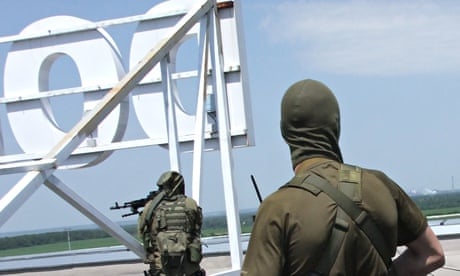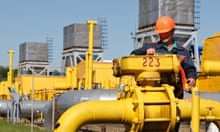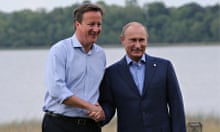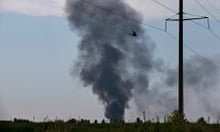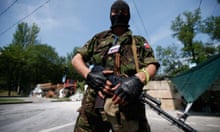In late April, 65 Russian men in groups of five to 10 crossed the border with Ukraine on foot, telling border guards they were going to visit relatives.
It wasn't a fond babushka who picked them up at the border, however, but rather pro-Russian rebels from the self-declared Donetsk People's Republic in eastern Ukraine. They bussed the Russian fighters to the regional capital, where they took up arms and last week engaged in the fiercest combat yet against forces loyal to Kiev.
"I was watching events in Odessa and was very upset about what was going on," said one of the Russian fighters, who would give only his wartime nickname "Varan" or "Monitor Lizard". Clashes between pro-Ukrainian and pro-Russian protesters in that city last month left more than 40 people dead. "I called up the military enlistment office and asked what I could do. They said people were gathering in Rostov and it may be possible to go to Ukraine. It's not official; they whispered it in my ear, so to speak."
The Russian fighters – including veterans of the military, intelligence services and riot police – formed the core of a new unit called the Vostok Battalion, which took a lead role in the bloody battle for the Donetsk airport last week, in which 33 Russian citizens were killed.
The story of how Varan and his brethren simply walked into the country highlights the problem that Ukraine has had in keeping out the growing number of Russians reinforcing local rebels in the two-month-old uprising in Luhansk and Donetsk regions. Recently, Ukrainian forces have reportedly captured vehicles carrying weapons from Russia, while others have got through, hinting at the porous nature of the 1,400-mile border between the two countries.
Speaking on national television on Friday, Anton Geraschenko, a top aide to Ukrainian interior minister Arsen Avakov, said establishing greater control of the border will be key to Kiev's "anti-terrorist operation" against pro-Russian rebels in the east.
"Closing the border is becoming the number one issue today," Geraschenko said. "All 23 years that Ukraine has been independent, our border with Russia has been fairly porous. We don't have exclusion zones, we don't have sufficient border defences."
On Friday, pro-Russian forces attempted to storm a border post near Dyakovo in Luhansk region from the Ukrainian side, the border service said, marking the latest in a string of similar clashes. Russian Cossacks who entered Ukraine last month reportedly took part in the assault. On Thursday night, there was a rebel attack on another border post further east.
Earlier last week, the border service said a column of 40 trucks and cars attempted to cross the border from Russia in the early hours of the morning, and many of them made it in during the ensuing firefight, in which one Russian was killed. Border guards reportedly captured a car and two minibuses, confiscating machine guns, grenade launchers, sniper rifles and 84 boxes of live ammunition.
"Our border, especially in the Donetsk and Luhansk regions, has become a front line that various 'terrorists' are trying to break through," border service head Mykola Lytvyn told journalists in Kiev on Wednesday. "Daily fighting with 'terrorists' and groups of criminals near the Ukrainian and Russian border has become our routine reality."
A weekend visit by the Observer to border crossings near the town of Uspenka in Donetsk region, where military forces reportedly repelled a rebel attack on 20 May, did find that border guards were delaying and checking vehicles coming from Russia. Paratroopers from a brigade based in the nearby Dnepropetrovsk region were opening boots at checkpoints on main roads leading from the border.
The commander of the main checkpoint said the military had been monitoring all traffic for the past three weeks, but added that the interior ministry was not doing its part to control the border region. Many police officers in restive cities in the east have supported the rebels.
"It doesn't do anything. We haven't seen a single police officer. The interior ministry has eliminated itself," he said.
But the regular traffic across the border of Russians and Ukrainians, many of whom have relatives on the other side, presents a trickier problem. Despite reports in April that Ukrainian authorities had barred Russian men aged 16 to 60 from entering the country, border service representatives denied there was such a restriction and said that the border was functioning under the same rules as before. Russian and Ukrainian citizens can cross without a visa.
The border runs directly between rustic one-storey homes in the tiny village of Stepne in the Donetsk region, where surveys show a majority of locals support more independence from Kiev.
Several locals told the Observer they would like to join Russia. At a tiny border service booth, Vladimir Uvorvikhvost, a pensioner from the nearby town of Amrosivka who was originally born in Russia, was waiting for his daughter and son-in-law to return from visiting relatives in the Russian city of Taganrog.
"Russia is our saviour. We won't go anywhere without Russia," Uvorvikhvost said.
Sergei, a taxi driver in Amrosivka who declined to provide his last name, said the border was well-patrolled now, but said not all roads into Russia had border posts. "You could bring in one machine gun, but no more than that. One you could take apart and hide in your underwear, as we say," he said.
The flow of Russian fighters is not likely to decrease any time soon, if Varan's experience is any indication. Many others in his homeland feel the same "outburst of patriotism" that he did, Varan said.
"Friends call me and ask me how it is here," he said. "They want to come too."
